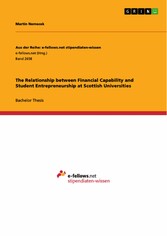The Relationship between Financial Capability and Student Entrepreneurship at Scottish Universities
von: Martin Nemecek
GRIN Verlag , 2018
ISBN: 9783668619296
, 77 Seiten
Format: PDF
Kopierschutz: frei
Preis: 29,99 EUR
eBook anfordern 
Mehr zum Inhalt

The Relationship between Financial Capability and Student Entrepreneurship at Scottish Universities
Bachelor Thesis from the year 2016 in the subject Business economics - Company formation, Business Plans, grade: A, University of Stirling, language: English, abstract: This study aimed to analyse the relationship between financial capability and student entrepreneurship at Scottish universities. Three research questions were considered based on the gaps and disagreements highlighted in the literature review. First: 'What is the level of financial capability of student entrepreneurs at Scottish universities and how does it differ from that of other students?' Second: 'What factors contribute to the financial capability development of student entrepreneurs?' and third: 'What are the relationships between specific components of financial capability and entrepreneurial attitudes and intentions?' Using a mixed method design to data collection, the study incorporated an online questionnaire and face-to-face interviews. Data were collected from 107 students and 30 student entrepreneurs. The questionnaire findings showed that student entrepreneurs exhibited higher levels of financial capability, were more willing to take risks and also viewed entrepreneurship as less risky, when compared to other students. The data also suggested the need for improving students' financial capability, especially regarding investments. Furthermore, the research established a remarkable relationship between financial capability and entrepreneurial attitudes and intentions. Interview data indicated that the development of financial capability is a complex process, but it is mainly shaped by parental influence, followed by internal triggers, experience concerning work and business and independent living. By establishing the need for improved levels of financial capability and the relationships between entrepreneurship and financial capability, this study recommends that both financial capability and entrepreneurship development programmes and policies should be encouraged to target students and student entrepreneurs with the groups' specific requirements in mind.











